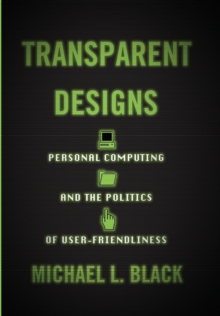Description
| Product ID: | 9781421443539 |
| Product Form: | Hardback |
| Country of Manufacture: | US |
| Series: | Studies in Computing and Culture |
| Title: | Transparent Designs |
| Subtitle: | Personal Computing and the Politics of User-Friendliness |
| Authors: | Author: Michael L. Black |
| Page Count: | 280 |
| Subjects: | Media studies, Media studies, History of engineering and technology, Personal computers, History of engineering & technology, Personal computers |
| Description: | This fascinating cultural history of the personal computer explains how user-friendly design allows tech companies to build systems that we cannot understand. Modern personal computers are easy to use, and their welcoming, user-friendly interfaces encourage us to see them as designed for our individual benefit. Rarely, however, do these interfaces invite us to consider how our individual uses support the broader political and economic strategies of their designers. In Transparent Designs, Michael L. Black revisits early debates from hobbyist newsletters, computing magazines, user manuals, and advertisements about how personal computers could be seen as usable and useful by the average person. Black examines how early personal computers from the Tandy TRS-80 and Commodore PET to the IBM PC and Apple Macintosh were marketed to an American public that was high on the bold promises of the computing revolution but also skeptical about their ability to participate in it. Through this careful archival study, he shows how many of the foundational principles of usability theory were shaped through disagreements over the languages and business strategies developed in response to this skepticism. In short, this book asks us to consider the consequences of a computational culture that is based on the assumption that the average person does not need to know anything about the internal operations of the computers we've come to depend on for everything. Expanding our definition of usability, Transparent Designs examines how popular and technical rhetoric shapes user expectations about what counts as usable and useful as much as or even more so than hardware and software interfaces. Offering a fresh look at the first decade of personal computing, Black highlights how the concept of usability has been leveraged historically to smooth over conflicts between the rhetoric of computing and its material experience. Readers interested in vintage computing, the history of technology, digital rhetoric, or American culture will be fascinated in this book. |
| Imprint Name: | Johns Hopkins University Press |
| Publisher Name: | Johns Hopkins University Press |
| Country of Publication: | GB |
| Publishing Date: | 2022-05-24 |


